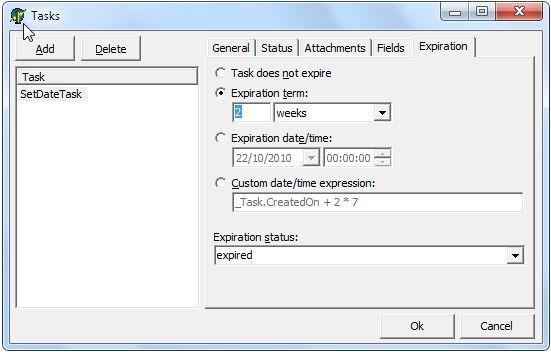
This Help topic refers to the following editions:
þ Enterprise þ Professional þ Small Business.
The task definitions are created in the task definition editor (Tasks dialog) for the Task block. When you double-click a Task block, the dialog is shown.
You can use Add and Delete buttons to add or delete task definitions. The list view at the left of the dialog displays the existing task definitons for the block. The name of task definition is displayed.
Name
Valid identifier that uniquely identifies the task definition. In the example below, "SetDateTask".
General
Subject
Contains the subject of the task. Used as a summary for e-mail messages or for the task list. Accepts expressions.
Description
Multi-line description of the task. Here all the instructions about the task should be inserted. Accepts expressions.
Assignment
The name of the user (or group) that the task instance will be assigned to. If it is a user, a single task instance will be created and will be assigned to that user. If it is a group, then the behaviour depends on the value of TWorkflowStudio.GroupAssignmentMode property:
gamMultipleTasks: This is default value. A task will be created for each user in the group. So, if a group has users "john" and "maria", one task will be created for John, and antoher to Maria, and the tasks will be independent (both will have to be concluded)
gamSingleTask: A single task will be created that will be visible for all users in the group. If you later include/remove users to/from the group, the existing tasks will become not visible for users removed from the group, and will become visible to users added to group. Any user from the group can update the task, including finishing it.
Send mail notification
If true (checked), then an e-mail notification will be sent to the user when the task instance is created.
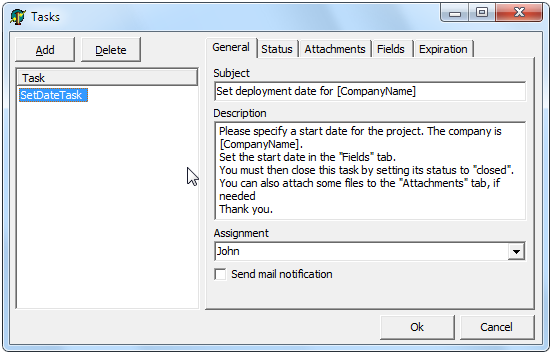
Status list
Contains a list of the valid status for the task.
The initial status of the task will be the first status in the list.
Some status can be marked as completion status, by checking the "Completion" option. When the status of a task instance changes to a completion status, the task is considered finished. You can have more than one status marked as a completion status.
Status with the "Hidden" option checked is a possible status to the task, but will not be displayed in user interface for changing the task status (like in the status combo box).
When a task instance is created, the valid status are displayed in a combo box in the task list dialog, and then user can change the status of a task.
If you have status templates predefined in your application, the user will be able to choose one of the templates by using the down arrow button at the right of the "Add" button.
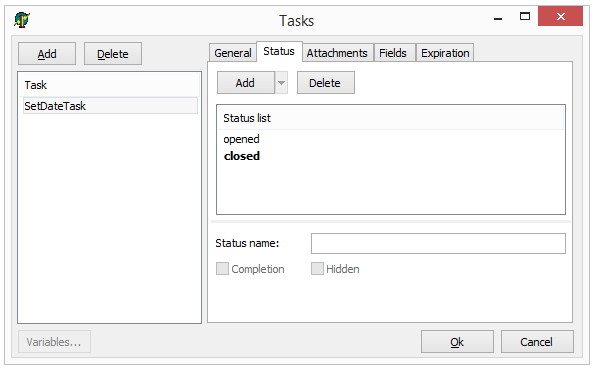
Defines the permissions for the users when handling attachments.
Show attachments
Shows the attachments tab in the task list. If false (unchecked), the user will not be able to do anything related to attachments (add, view, etc.). If true (checked) the user will be able to, at least, open and view attachments.
Allow remove attachments
If true (checked), allows the user to remove attachments from the task instance
Allow insert attachments
If true (checked), allows the user to insert new attachments to the task instance
Allow edit attachments
If true (checked), allows the user to open an existing attachments for editing, and updating its content.
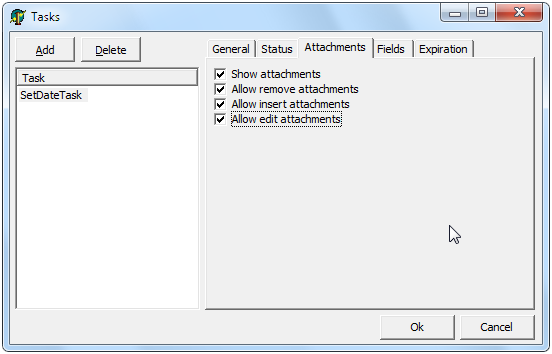
Fields
Defines fields for the task instance. One or more fields can be defined for a task. A field is a placeholder for a value. All task fields are shown when a task instance is being displayed for a user in the task list dialog. Fields can be useful for users to see extra information related to the task, or for users to input valuable information. They add an extra level of flexibility.
A field is always related to a workflow variable, which is the real container for the field value. A field does not have a "value" it just reads/writes values from/to a workflow variable.
Text caption
It is the name of the field which will be displayed for the user
Workflow variable
The name of the workflow variable related to the field. Fields read the value from the workflow variable, and write back the value to the workflow variable, if the user changes the value.
Read only
Mark the field as read-only, so the information is visible but not editable.
Editor type
Chooses the type of editor control used to edit/view the value of the variable when the user is editing the task.
Valid values can be:
| · | Text: edit box for free text editing |
| · | Check: checkbox for boolean values |
| · | Date: date picker for date values |
| · | Memo: memo for free multiline text editing |
| · | DropDown: combobox with a list of items to choose (you can define the items to be displayed in combobox) |
Required
When a field is required, the task instance can not be saved (altered) until a value is filled in the field. So, users cannot add, remove, edit attachments, or change task status, or change any other information in the task instance, if the field specified as required is empty.
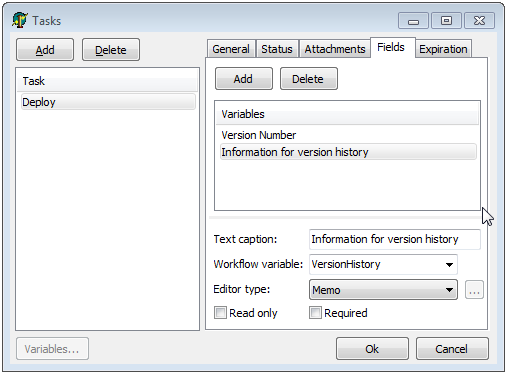
Defines the date/time for expiration of a workflow task. If a task has a defined expiration date/time, when it exceeds this date/time without being closed by an user (changed to a completion status), its status is automatically changed to an expiration status.
Task does not expire
This is the default option. If checked, the task will never expire, and will keep assigned to the current user/group until finished (changed to a completion status).
Expiration term
Check this option to enter an expiration term for the task, and enter the amount of days, weeks or months (integer or floating point value). The expiration date will be calculated from the creation date of the task.
Expiration date/time
Check this option to enter a fixed due date/time for the task.
Custom date/time expression
This option allows to enter a custom expression to evaluate the task expiration date/time. The expression must return a DateTime value and may use variables from the current workflow, task properties (is common to use _Task.CreatedOn property to retrieve the task creation date/time and calculate the expiration date), as well as all the features allowed in expressions.
Expiration status
Determines the status to which the task will be automatically changed after expiring. It must be a completion status.
